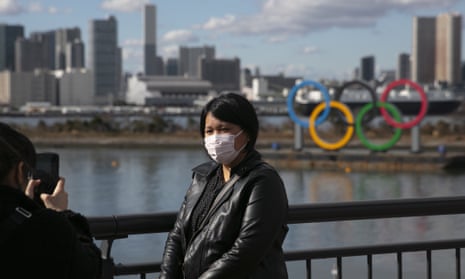Concern is growing over the impact of the coronavirus on the Olympic Games after new cases in Japan were confirmed and the domestic top-flight football competition was called off until next month.
A senior member of the International Olympic Committee (IOC) said outright cancellation of the Games, rather than postponement or relocation, would be likely if the disease proved too dangerous for the event – which is scheduled to start on 24 July – to go ahead.
Dick Pound, a former Canadian swimming champion who has been on the IOC since 1978, estimated there is a three-month window – perhaps a two-month one – to decide the fate of the Tokyo Games, meaning a decision could be put off until late May.
“In and around that time, I’d say folks are going to have to ask: ‘Is this under sufficient control that we can be confident about going to Tokyo or not?’” Pound told Associated Press.
As the Games draw near, he said, “A lot of things have to start happening. You’ve got to start ramping up your security, your food, the Olympic Village, the hotels. The media folks will be in there, building their studios.”
If the IOC decides the games cannot go forward as scheduled in Tokyo, “you’re probably looking at a cancellation”, he said.
Three new coronavirus cases were confirmed on Tuesday among users of the same gym in Chiba. The city, just north of Tokyo, is scheduled to host Olympic taekwondo, fencing, wrestling and surfing, as well as four Paralympic events.
Sporting events across Japan have already been called off due to the outbreak; all J-League football has been postponed until 15 March, the biggest disruption of the professional game in Japan since the 2011 earthquake and tsunami.
The South African Under-23 team has also pulled out of a friendly due to be played against Japan in Kyoto on Thursday, while training for 80,000 Olympic volunteers, which was due to begin on 22 February, has been delayed for at least two months.
In addition to professional sport, numerous local competitions, inter-school matches and martial arts tournaments are being postponed or axed. This Sunday’s Tokyo Marathon will feature only a few hundred elite athletes, with nearly 38,000 entrants told they cannot run.
The viral outbreak that began in China two months ago has infected more than 80,000 people globally and killed over 2,700, the vast majority of them in China. But the virus has gained a foothold in South Korea, the Middle East and Europe, raising fears of a pandemic. Japan itself has reported four deaths.
Some of Japan’s biggest corporations, including Sony, Takeda Pharmaceuticals and telecoms giant NTT, are telling staff to work from home. Many were planning to introduce telework during the Olympics to ease the pressure on public transportation, but are now doing so to avoid the risk of contamination on Tokyo’s crowded trains.
The Tokyo Olympic organising committee puts the official budget for the Games at 1.35tn yen ($12.2bn), but the Board of Audit of Japan estimates the true cost, including spending by local authorities and the central government, is more than double that figure.
The modern Olympics, which date to 1896, have been cancelled only during wartime. The Olympics in 1940 were supposed to be in Tokyo but were called off because of Japan’s war with China and the second world war. The Rio Games in Brazil went on as scheduled in 2016 despite the outbreak of the Zika virus.
Pound repeated the IOC’s stance – that it is relying on consultations with the World Health Organization, a United Nations body, to make any move.
As for the possibility of postponement, he said: “You just don’t postpone something on the size and scale of the Olympics. There’s so many moving parts, so many countries and different seasons, and competitive seasons, and television seasons. You can’t just say, ‘We’ll do it in October.’”
Pound said moving to another city also seems unlikely “because there are few places in the world that could think of gearing up facilities in that short time to put something on”.
